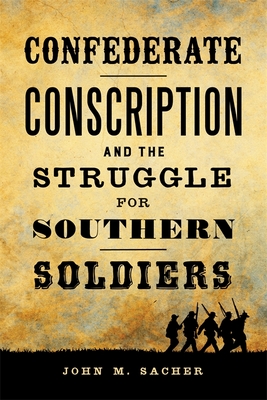Winner of the Jules and Frances Landry Award
Finalist for the 2022 Gilder Lehrman Lincoln Prize
In April 1862, the Confederacy faced a dire military situation. Its forces were badly outnumbered, the Union army was threatening on all sides, and the twelve-month enlistment period for original volunteers would soon expire. In response to these circumstances, the Confederate Congress passed the first national conscription law in United States history. This initiative touched off a struggle for healthy white male bodies--both for the army and on the home front, where they oversaw enslaved laborers and helped produce food and supplies for the front lines--that lasted till the end of the war.
John M. Sacher's history of Confederate conscription serves as the first comprehensive examination of the topic in nearly one hundred years, providing fresh insights into and drawing new conclusions about the southern draft program. Often summarily dismissed as a detested policy that violated states' rights and forced nonslaveholders to fight for planters, the conscription law elicited strong responses from southerners wanting to devise the best way to guarantee what they perceived as shared sacrifice. Most who bristled at the compulsory draft did so believing it did not align with their vision of the Confederacy. As Sacher reveals, white southerners' desire to protect their families, support their communities, and ensure the continuation of slavery shaped their reaction to conscription.
For three years, Confederates tried to achieve victory on the battlefield while simultaneously promoting their vision of individual liberty for whites and states' rights. While they failed in that quest, Sacher demonstrates that southerners' response to the 1862 conscription law did not determine their commitment to the Confederate cause. Instead, the implementation of the draft spurred a debate about sacrifice--both physical and ideological--as the Confederacy's insatiable demand for soldiers only grew in the face of a grueling war.









